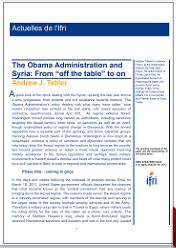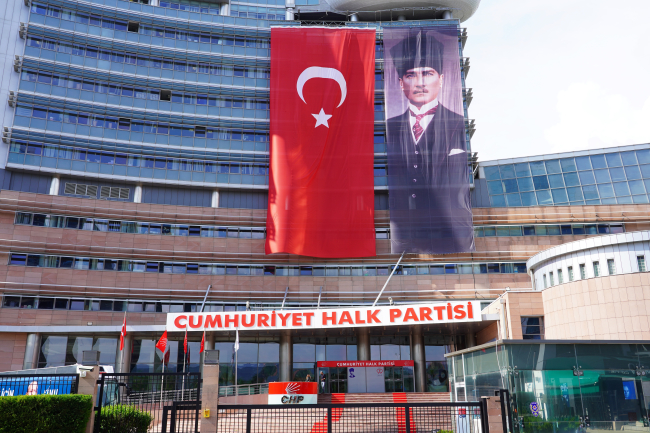The Obama Administration and Syria: From "off the table" to on

A quick look at the news dealing with the Syrian uprising the last year shows a slow progression from protests and civil resistance towards violence. The Obama Administration’s policy dealing with what many have called “slow motion revolution” has evolved in fits and starts, with mixed episodes of confusion, assertiveness, denial and drift.
As regime violence flared, Washington moved policies long viewed as unthinkable, including sanctions targeting the Assad family’s inner circle, oil sanctions as well as an overt, though understated policy of regime change in Damascus. With the armed opposition now a sizeable part of the uprising, and Sunni extremist groups claiming massive bomb blasts in Damascus, Washington is now stuck at a crossroads: continue a policy of sanctions and diplomatic isolation that will help bring down the Assad regime in the medium to long term as the country tips toward greater violence or adopt a more robust approach involving military assistance to the Syrian opposition and perhaps direct military involvement to hasten Assad’s demise and head off what many predict could be a civil war that is likely to suck in regional and international powers alike.
Phase One – coming to grips
In the days and weeks following the outbreak of protests across Syria on March 15, 2011, United States government officials discounted the chances that what became known as the “protest movement” had any chance of bringing down the Assad regime. The reasons made sense: the Assad regime is a minority-dominated regime, with members of the Alawite sect serving in the upper ranks of the country multiple security services and of the Army. Therefore a military coup akin to that in Tunisia or Egypt, where military ousts the ruling family for the sake of the nation as a whole, was unlikely. The memory of Saddam Hussein’s Iraq, where a Sunni-dominated regime endured international sanctions and isolation and was in the end only ousted through a military invasion, was still fresh in the minds of policymakers in the State Department and White House. And given that the Obama Administration was elected on the platform of withdrawing United States troops from Iraq, another military adventure was off the table. The White House therefore adopted a general policy approach that continues to this day: that it would not say anything in response to the crisis that it did not truly intend to do.

Available in:
Regions and themes
ISBN / ISSN
Share
Download the full analysis
This page contains only a summary of our work. If you would like to have access to all the information from our research on the subject, you can download the full version in PDF format.
The Obama Administration and Syria: From "off the table" to on
Related centers and programs
Discover our other research centers and programsFind out more
Discover all our analyses
RAMSES 2025. Between Powers and Powerlessness
Never before have there been so many powers able to upset the international balance of power, and never before have the dominant powers seemed so powerless to counter the fragmentation of the world.
Out of Thin Air but More than a Mirage: The Politics of Saudi Arabia's Nascent Music Industry
This study critically examines Saudi Arabia’s nascent music industry, which is promoted as a key element of Vision 2030, Crown Prince Mohammed bin Salman’s strategic framework to diversify the kingdom’s economy. It explores how state-led investments in music and entertainment intersect with authoritarian governance. The author neither dismisses these investments as conspicuous spending nor reproduces an alarmist narrative of impending cultural imperialism. The article takes a political sociology approach to understand how Saudi entertainment plans consolidate domestic power and reshape regional cultural landscapes.
Hostage diplomacy of the Islamic Republic of Iran. The case of Europeans detained in Iran
The so-called hostage diplomacy of the Islamic Republic of Iran refers to a political and diplomatic strategy in which Tehran uses the detention of Western nationals, dual citizens, or Iranian citizens residing in Europe, Australia, or the United States as leverage in diplomatic negotiations. This practice aims to exert pressure to secure political, economic, or diplomatic concessions as part of Tehran’s asymmetric response strategy. Hostage diplomacy remains a controversial yet effective tool from the perspective of the Islamic Republic of Iran, given its context of economic sanctions and diplomatic isolation.
Is the Republican People’s Party (CHP) Rising from the Ashes?
The victory of the CHP [Cumhuriyet Halk Partisi, Republican People’s Party] in the Turkish municipal elections of March 2024 firmly established it as the leading party of opposition to the Islamic-conservative AKP [Adalet ve Kalkınma Partisi, Justice and Development Party], which has been in power since 2002.







